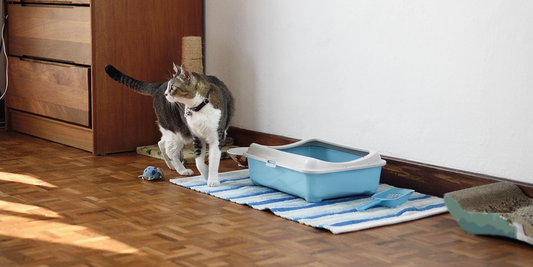Having a furry feline companion is a joy, but dealing with unpleasant odors from the litter box is a common challenge for cat owners. Fortunately, there are effective strategies to ensure that your home remains odor-free while providing a comfortable environment for your cat. In this article, we will explore essential tips and tricks for keeping odor away with a clean litter box.
Keeping Odor Away With a Clean Litter Box
Cats are known for their impeccable cleanliness, but their litter boxes can still generate unwanted smells. To maintain a fresh-smelling home, it's crucial to adopt the right practices when it comes to your cat's litter box. By following these steps, you can effectively manage and prevent odors:
Choosing the Right Litter
Selecting the appropriate litter is the first step in odor control. Opt for clumping litter made from natural materials like clay or corn. These types of litter effectively absorb moisture and lock in odors, making it easier to scoop and clean the box.
Regular Scooping
Scooping your cat's litter box daily is essential. When waste sits in the box for extended periods, it can emit strong odors. Regular scooping not only keeps the box clean but also prevents the buildup of odor-causing bacteria.
Proper Cleaning Schedule
In addition to daily scooping, it's important to deep clean the litter box on a weekly basis. Empty the entire box, wash it with mild soap and water, and replace the litter. This routine prevents odors from accumulating and maintains a fresh environment.
Right Location
The placement of the litter box matters. Choose a quiet, low-traffic area that provides your cat with privacy. Avoid placing the box near their food and water bowls to create a distinct separation between their eating and bathroom areas.
Using Baking Soda
Baking soda is a natural deodorizer that can help neutralize odors in the litter box. Sprinkle a thin layer of baking soda at the bottom of the box before adding fresh litter. This simple trick can make a noticeable difference in odor control.
Covered vs. Uncovered Boxes
While covered litter boxes may seem like a good idea for containing odors, some cats prefer uncovered boxes. Covered boxes can trap odors inside and make your cat feel confined. If you choose a covered box, ensure proper ventilation and monitor your cat's comfort level.
Odor-Neutralizing Additives
Consider using odor-neutralizing additives specifically designed for cat litter. These additives can be mixed with the litter to provide extra odor control, keeping your home smelling fresh.
FAQ's
Q: How often should I change the entire litter in the box?
A: It's recommended to change the entire litter in the box at least once a month. However, regular scooping and cleaning should be done more frequently to maintain a fresh environment.
Q: Can I use scented litter to control odors?
A: Scented litter may cover up odors, but some cats are sensitive to strong scents. It's best to opt for unscented litter and focus on proper cleaning and maintenance.
Q: Is it necessary to buy an expensive litter box?
A: Expensive litter boxes may come with additional features, but a simple and well-maintained box can be just as effective in controlling odors.
Q: My cat is avoiding the litter box. What should I do?
A: If your cat is avoiding the litter box, there might be underlying issues. Consult your veterinarian to rule out any medical problems and address behavioral concerns.
Q: Are there any home remedies for litter box odor control?
A: Using baking soda, as mentioned earlier, is a simple and effective home remedy for controlling litter box odors. Additionally, ensuring proper cleaning and scooping routines can significantly reduce odors.
Q: Can I use regular cleaning products to clean the litter box?
A: Avoid using harsh cleaning products with strong scents, as they can deter your cat from using the box. Stick to mild soap and water for cleaning the litter box.
Conclusion
Maintaining a clean litter box is essential for both your cat's well-being and a pleasant living environment. By choosing the right litter, adopting a regular cleaning routine, and implementing odor-control strategies, you can effectively keep odors at bay. Remember to prioritize your cat's comfort and preferences while also focusing on creating a hygienic and odor-free space for your home.








